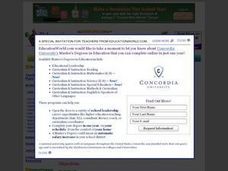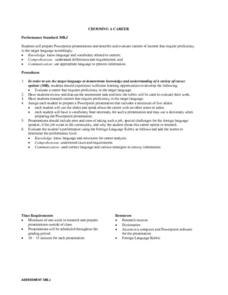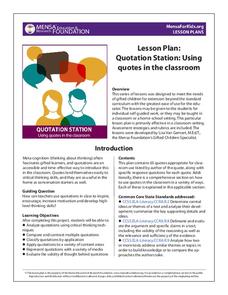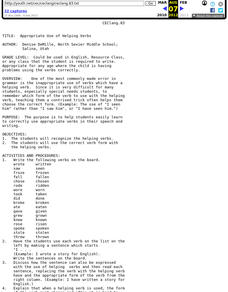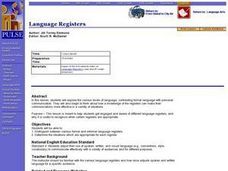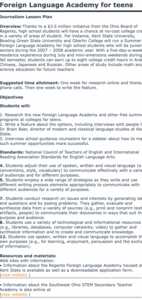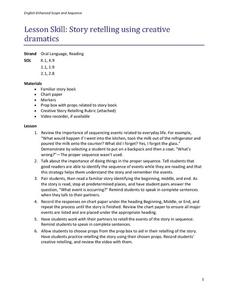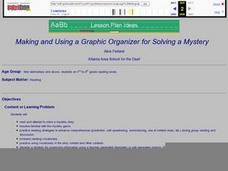EngageNY
Drafting Body Paragraphs
That's just the style. Learners begin with a mini-instructional activity about formal writing style. They then use what they learned about formal writing to begin the body paragraphs for their End of Unit 1 Assessment Prompt: Adversity...
Premier Literacy
Point of View
Incorporate technology into a literature lesson with an innovative language arts lesson. Middle schoolers read an electronic version of original stories or fairy tales, and after determining the point of view, rewrite the tale from a...
Curated OER
Satire and The Adventures of Huckleberry Finn
Does Mark Twain’s satire become sarcasm and does he cross the line of propriety in The Adventures of Huckleberry Finn? As an introduction of satire, class members view an excerpt from The Daily Show and discuss Stewart's use of this...
Scholastic
Persuasive Communication (Grades 9–12)
Before your students reached your morning class to learn about persuasive writing, they probably saw dozens of examples of persuasive communication in the form of advertisements. A short, introductory lesson inspires class members to...
EngageNY
Performance Task: Planning the Final Brochure
Partners use a Brochure Planning Guide to create brochures giving advice to consumers about products based on the research they finished about working conditions. After planning the brochure, they complete a sketch outline and then begin...
Curated OER
Non-Verbal Communication
Many developmentally disabled young scholars struggle with accurately conveying messages and interpreting those of others around them, especially when they are non-verbal. This lesson contains fun activities and exercises, such as...
Curated OER
Poetry Shopping Spree
Scholars demonstrate the ability to evaluate authors' use of literary elements such as metaphor, simile, personification, imagery, and onomatopoeia. They are provided with a checklist and must shop for poems that contain the poetry terms...
Curated OER
Choosing a Foreign Language Career
"Why do we have to learn a foreign language?" Have you ever heard that question before? Give your novices this project, and have them research different jobs that require the use of a foreign language. They create a PowerPoint...
Curated OER
Using Context
Teams practice decoding and using context strategies to determine the meanings of unfamiliar words. After verifying the meanings of words through the use of dictionaries, the Internet, thesauruses, and other sources, learners write the...
MENSA Education & Research Foundation
Quotation Station: Using Quotes in the Classroom
An informative list compiled with quotes, authors, and discussion questions, along with 20 out-of-the-box application ideas, make up the collection of lessons geared to spark dialogue and creative thinking about quotations.
EngageNY
Interpreting, Integrating, and Sharing Information about DDT: Using Cascading Consequences and Fishbowl Protocol
What is your interpretation? Scholars look at their Cascading Consequences Charts and interpret the information they have gathered. Learners match claims with evidence and then watch a video. At the end, they carry out a fishbowl...
Meadows Center for Preventing Educational Risk, University of Texas at Austin
Lesson 15 - Soft G and Soft C
The names Cindy and Carrie start with the same letter, but have very different sounds. The 15th of 17 word recognition lessons focuses on the soft C sound found in Cindy and the soft G sound found in Gene. Direct instruction starts with...
Ascanius: The Youth Classics Institute
Anatomy and Simple Commands
Poor Joe is all in pieces, and he needs students to learn the Latin words for his body parts so that they can put him back together! Learners work as a class first to perform whole-body reconstruction, and then individually. In addition,...
Curated OER
Appropriate Use of Helping Verbs
Intended for learners struggling with or having issues using auxiliary verbs, this activity has them orally compose sentences using one of the provided helping verbs. They will attempt to find patterns in groups of verbs and make class...
Curated OER
Appropriate Use of Helping Verbs
Readers of all ages correctly use appropriate verbs in their speech and writing. The focus of this lesson is on the proper use of helping verbs.
University of Arizona
Language Registers
Do you speak to your parents the same way you speak to your friends? The differences between formal and informal language are highlighted in this exercise. Groups are asked to select a scenario and script different dialogues that might...
Curated OER
Language Arts Writing Project
Students practice writing open-ended questions about a specific topic. They use proper grammar and syntax in their questions that are typed into a word processing file. A rubric is included in this lesson plan to help with assessment.
Curated OER
Journalism: Foreign Language Summer Program for Teens
Students research the new Foreign Language Academy and other free summer programs at colleges for teens. They write features stories about the opportunities and interview deans and university officials. Students also interview school...
Curated OER
Story Retelling Using Creative Dramatics
Doing things in the proper sequence is the focus of a solid language arts activity. In it, pupils discuss the importance of doing things in the right order. Then, they pair off and read a short story together. They must retell the story...
Curated OER
Using a Dictionary
When do we use dictionaries? Provide this dictionary scavenger hunt for your youngsters. Third and fourth graders search for words, recording the number of syllables or definition for a variety of words. Get your class using dictionaries...
Curated OER
Making and Using a Graphic Organizer for Solving a Mystery
Students create tables in a word processing program which helps them organize their text clues when reading a mystery story. They develop reading comprehension strategies while using a computer based graphic organizer in order to solve...
Curated OER
Elaborating the Main Idea, Using Supporting Details
A desk is used as a visual analogy to construct the main idea and supporting details in a story. The top of the desk is the main idea, and each of the four legs provides supporting details. The legs of the desk provide support for the...
Curated OER
Hamlet Research Paper: Find, Evaluate, and Select Appropriate Research Sources
Help young researchers find credible sources online. Modeling with a Google search for information about Shakespeare’s Macbeth, use a computer projector or Smart Board to show class members how weak the top three search results are....
Ontario
Critical Literacy—Media Texts
Media texts convey both overt and implied messages. As part of their study of media, class members analyze the language, form, techniques, and aesthetics in a variety of media texts.








